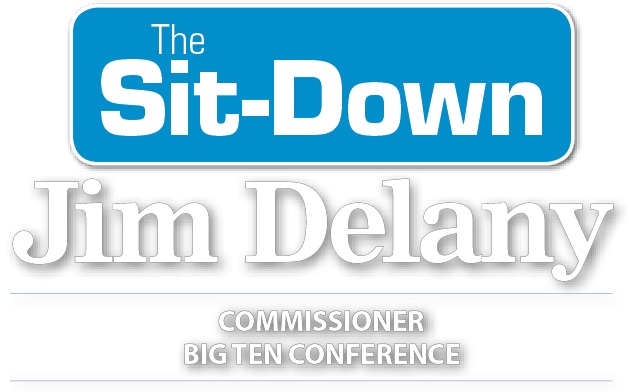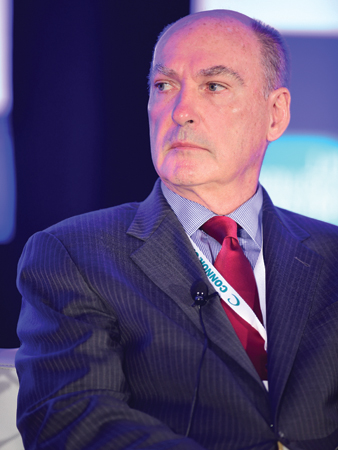
I think the more educational we are, the more sustainable we are.
We made really big mistakes [in] the ’70s when we walked away from the four-year grant. When we walked away from the laundry money. As a student athlete myself, that $15 a month was meaningful, so I understand when you’re on a campus and you don’t have any money for miscellaneous expenses, that’s an issue.
When you monetize everything that can be monetized, it opens up the discussion about what you do as the primary purpose, of what you’re about. So I think the more you go into that commercial area of exploitation, the more you’re going to get these questions raised.
 |
Photo by: MARC BRYAN-BROWN
|
With some of these video games, and sales of jerseys, and sales of playing cards,
we’ve walked into an area that is somewhat of a philosophical and practical trap.
I would be inclined to do less in those areas, to enhance the educational grant and the opportunity to complete the education, and try to provide it for as broad an array of young people as we can.
Sometimes you say no to yourself because it’s better for the overall climate within which you operate.
The Rose Bowl, as an example, has been an important brand and relationship for us for over 50 years. And while there has been more commercialization there than perhaps there was 25 years ago, we still reject an entitlement.
Someone said to me, you know, “How are you going to do in your next TV negotiation?” I hope we do really well, because we’re spending in excess of $200 million a year in financial aid.
Financial aid is increasing at double the rate of inflation, at least it has over the last decade. We’re going to have cost of attendance which will be another 10 percent on that scholarship for all men and women. And I’m thinking, you know, it’s going to be between $4 [billion] and $6 billion over the next 15 years for scholarships, cost of attendance, miscellaneous expenses, counseling, nutrition, etc.
We’re moving the aircraft carrier, collegiate sports, in the right direction.
This is a unique year from a legislative planning perspective, because we didn’t get the autonomy until really last summer.
I think there’s a mis-impression that these five conferences have complete legislative autonomy in all legislative areas, and it’s really only in the definition of the scholarship and maybe some other welfare benefits.
We needed some flexibility in this area of student-athlete welfare, cost of attendance, but we also felt strongly that if we could, we wanted to be in the big tent. We wanted to share revenue from the NCAA tournament. We wanted to have the championship system for all students in all Division I schools. So, we were able to I think find a reasonable compromise.
The NCAA is our trade association and sometimes they do well, and sometimes they don’t. But when they don’t do well, it’s because we don’t do well. We are the NCAA.
The dialogue ought to be about education. It ought to be about opportunities. It ought to be about fairness. It ought to be less about, you know, return on investment and year over year and all that.
Our conference … wanted to get to a better place in terms of the allocation of opportunity, so we cut football scholarships, OK, we cut basketball scholarships, we reduced squad sizes and we invested in women’s athletics. So today we’re at 50-50. Those were not easy things to do.
We would be a lesser system if we’re not able to provide 100,000 opportunities in Division I, if we’re not able to provide them on an equitable basis.
There are two kinds of impressions in life; the first impression and the closing argument. And I think Ohio State made a heck of a closing argument.

[College Football Playoff Selection Committee Chairman] Jeff Long did a fabulous job. … He was accessible, articulate and represented that committee well.
People didn’t like the computers; they want it to be more human. I think this committee was human.
We want to play big games. I don’t want to discourage our schools from playing big games. Whether you win or you lose, you play LSU in Houston or you play Oregon at Oregon, I want those things to happen and I don’t want them to feel that the season is over because they lose a big game on Sept. 5.
I think sports rights are breakthrough programming. It’s TiVo proof in many, many ways, but there’s also change on the horizon. There’s changes in technology, there’s change in the regulatory environment, there’s changes in the consumer consumption habits. So all of those are variables that you’ll try to measure.
We should not be the de facto exclusive minor leagues … for professional sports. That was not intended, that has developed.
I think the athlete needs choice. If they want to go on a professional track, fine, but that’s not our role.






